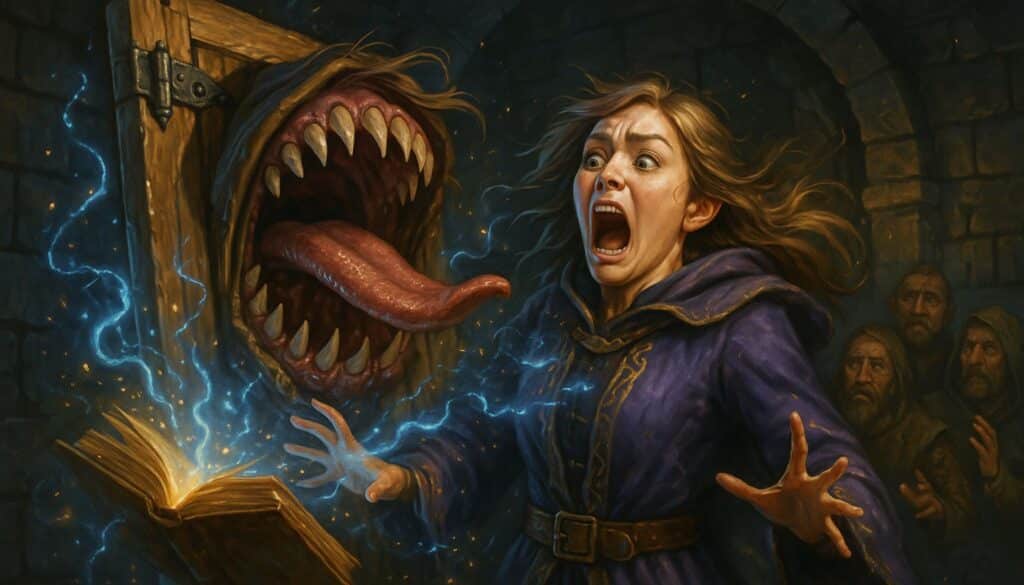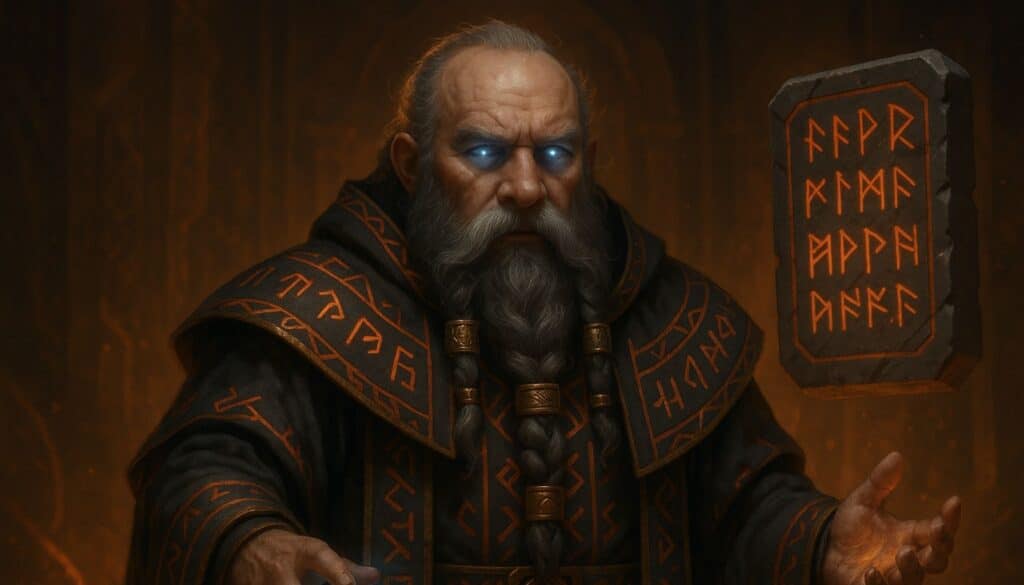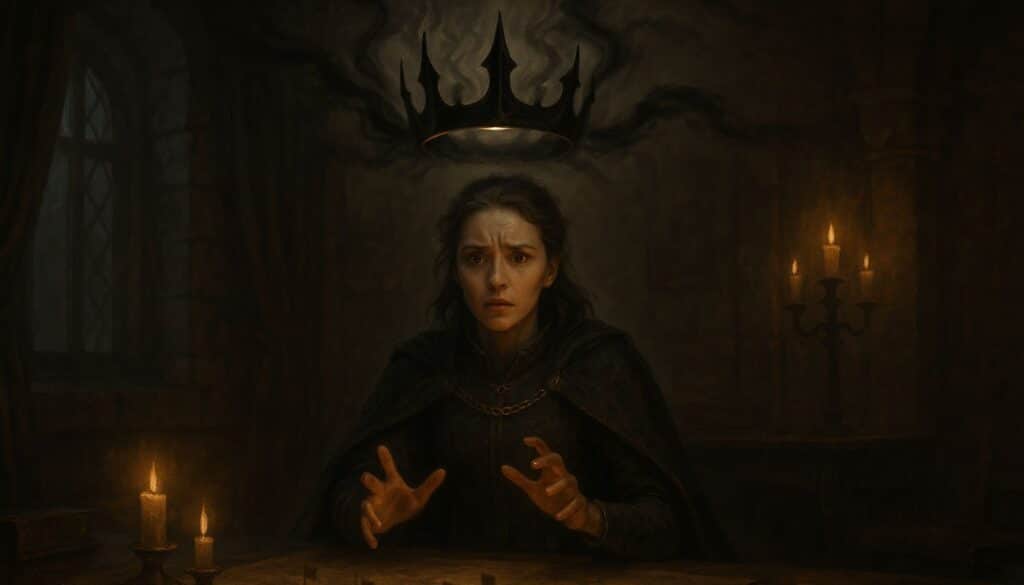Curses in Dungeons & Dragons rarely linger in memory when they’re just numbers on a D&D character sheet. An itching rash, a night of bad dreams, a sticky -1 to attack rolls. These fade from the mind, handled by a spell or a trip to the nearest temple. Yet, when curses snake into the marrow of a character’s morals the table goes quiet. Players lean in. This is where curses transform from mechanical annoyance into narrative engine.
Think of curses as storytelling invitations. A curse that stains a paladin’s hands whenever they lie. A mark on a wizard’s soul, tempting them to trade memories for raw magical power. These afflictions refuse to sit quietly. They demand that the cursed wrestle with who they are and what they’re willing to sacrifice. Inside these moments, roleplay flourishes. The dice grow heavy.
Layered moral curses deepen character arcs and drive campaigns forward. Every lingering effect, each twist of the knife, serves as an ethical mirror, one that reflects the choices, grudges, and secrets dragging behind each player. Tension rises not from numbers but from impossible choices: save the village, or spare a loved one’s soul? Betray a party member, or lose your own freedom? Than cold punishment, these are crucibles for growth and story.
For Dungeon Masters, moral curses become tools with teeth. They introduce ticking clocks, splinter party unity, and push fate’s wheel down unexpected roads. In this way, curses aren’t simply baleful mechanics; they’re forged in consequence, sharpened by roleplay, and handed to players as opportunities for transformation.
This guide arms you with the techniques, examples, and imaginative fuel to craft curses that bite deeper. Use these ideas as a toolkit for unforgettable games where choices cut, ambitions collide, and curses become catalysts for legends.
Why Moral Curses Matter in Your D&D Campaign
Moral curses build stakes that the usual “remove curse” incantation cannot scrub away. Ordinary curses raise annoyance; moral curses raise questions—hard, smoldering ones. They linger in a campaign’s bloodstream, trailing after every decision, growing in intensity as the party quests onward. These curses infect hearts and bonds, not just hit points.
When a curse is more than a penalty, it becomes a form of storytelling currency. Maybe the rogue’s enchanted blade hungers for betrayal, gaining power each time its wielder deceives an ally. No restoration spell undoes the trust frayed at the table. The curse’s presence becomes its own quest—a living, tormenting imperative humming beneath every word.
Try my AI Tabletop RPG generators...and an extensive library of content!
Party dynamics shift in the shadow of a moral curse. One character might wrestle with guilt, another with suspicion, a third with opportunity. Conflict blooms. The curse now tests loyalty and identity, not only tactical mettle. The binary solution—cast the spell and be done—dissolves into a muddy spectrum of possibilities. Who will help bear the burden? Who will judge? Who will exploit?
These afflictions rarely end cleanly. A moral curse resists tidy closure—it stretches into campaign arcs, unfurling personal quests and unexpected alliances. The line between curse and quest evaporates, leaving the players tangled in a story that asks more than “did you win?” It asks: “who are you becoming?”
Building the Moral Dilemma
Designing a moral curse requires a sculptor’s hand. The curse itself should demand more than bearing pain or inconvenience—it must linger, asking for choices punctured with lasting consequences. Begin with stakes that bleed into the character’s history, relationships, or values. Find what matters most to the cursed: loyalty, ambition, faith, or fear. Make the curse touch that nerve.
⚔️ Fantasy RPG Random Tables Books
Make life as a Gamemaster easier…
If you play Dungeons & Dragons, Pathfinder, or other fantasy RPGs, this
RPG random tables series
is packed with encounters, NPCs, treasure, and more. Available in eBook or print—either way, you’ll have a wealth of adventure ideas at your fingertips.
Easy solutions cheapen the effect. If a simple errand or ritual closes the wound, it never grows infected, never goads the player into dangerous territory. Complications bloom in the ambiguity—let the solution feel murky, knotted, perhaps shrouded in contradiction. Introduce ambiguity. Is breaking the curse truly worth the cost?
Tie the curse to personal flaws or unresolved pasts. Suppose the necromancer is branded by a vengeful spirit—they can only halt the decay if they let go of their thirst for forbidden secrets. Or perhaps a fighter bears an ancestral burden: their wounds heal twice as fast, but with every battle, memories of their ancestors burn away. What’s left when glory costs identity?
Moral curses thrive on a slow simmer. Let them fester. Layer on symptoms, side effects—moments when the curse reveals itself in new, unexpected ways. An outburst at a friend. A nightmare that foreshadows the worst outcome. Misdirect when necessary. Maybe the true condition lurks below the surface, only emerging after trusted bonds are already strained.
Sometimes, the curse pounces as a twist. The artifact handed to the sorcerer as a reward slowly warps their empathy, muting emotional connections. By the time the realization dawns, choices already cut deep. From here, the only way out is through.
15+ Moral Dilemma Curse Examples
- A ring that heals the wearer’s wounds, but inflicts identical pain on someone nearby each time.
- A sword that grows in potency for each betrayal the wielder commits.
- A tattoo that forces the bearer to kill an innocent weekly or suffer torments worse than death.
- A chain binding the owner’s soul to that of a mortal enemy—only teamwork sustains them, but killing one dooms both.
- Eyes that see through lies, but blind the user to acts of kindness.
- A voice in the mind, offering advice that only grows more sinister when followed.
- Gear that cannot be removed unless the character forsakes all family ties.
- A melody that grants one wish if sung in grief, but curses a loved one with madness.
- The shadow that attacks enemies but slowly erases the bearer’s memories of friendship.
- Each time the character rests, someone they care about suffers night terrors.
- Carrying a relic that grants power, but causes innocent creatures around the party to sicken and die.
- A curse of silence: when the character speaks truth, allies become suspicious and hostile.
- Gold that multiplies, but each coin spent kills a living plant within a mile.
- Wings that allow flight, but the air fills with poison for every day aloft.
- The curse of the shifting face: each time the character lies, their face changes, stealing a part of their original identity.
- Weapon that grows lighter and faster with every broken promise.
- Mirror curse: saving oneself from harm visits equal misfortune on a chosen friend.
The magic of these curses lies in choice. The more agonizing the decision, the sharper the character development.
Commitments and regrets, bargains and betrayals—moral curses test the heart, not just the flesh.
Moral conflicts over curses thrive on player buy-in. Before unveiling a curse of this depth, coordinate with players who crave meaning and emotional stakes. Surprises land hardest when seeded with trust. Give choices weight and consequence, never robbing agency. These are opportunities for transformation, not pointless misery.
Show your players the curse’s gravity. Then let them steer their journey—toward damnation, redemption, or somewhere infinitely stranger.

Weaving Curses Into the Story
Embedding a moral curse starts with its origin. Was it punishment from a slighted deity? The byproduct of an ancient, broken pact? Or the cold hand of a restless ghost unconcerned with mortal morality? Tie the curse’s birth to the campaign world’s deeper roots—history, myth, betrayal, legacy.
The world rarely stays silent in the presence of a living curse. Allies might withdraw in fear, seeing danger clinging to the cursed. Rivals sniff opportunity in this weakness. The city’s priests could brand the party as blasphemers. Or a hidden cult, seeking to claim the cursed power for themselves, stirs beneath the streets.
Let the curse ripple through the campaign, evolving as decisions are made. If the group sacrifices innocents to feed a vampiric blade, word may spread, turning hunters and would-be redeemers upon them. If the paladin chokes back hatred and offers forgiveness to an old foe—perhaps their curse twists, granting unexpected gifts or new challenges.
A living curse transforms with the actions of its bearer. Narrative consequences strike fastest in the subtle shifts: the party’s reputation, the temper of rivals, the one-time friend grown cold. Each choice shapes the path ahead; the curse moves from plot device to narrative thread, coiling through every arc.
Most curses refuse to stay static. As the party changes course, the curse adapts, escalating or easing. Sometimes it grows harsher, demanding greater sacrifices. Other times, a single act of compassion, resolve, or cruelty turns the entire campaign sideways. That unpredictability sparks investment.
| Curse Name | Moral Dilemma | Narrative Hook | Suggested Resolution Path |
|---|---|---|---|
| Soulbound Rival | Save or doom your enemy | Ancestral feud—linked fates | Cooperate to break curse, risking betrayal |
| The Betrayer’s Blade | Power for treachery | Famous assassin’s weapon, now in party hands | Destroy weapon or resist its temptations |
| Martyr’s Mark | Suffer to protect another | Curse tied to saving a life at great personal cost | Sacrificial act or genuine forgiveness |
| Echoing Lament | Heal friends, harm innocents | Healing magic has public fallout | Atonement for unintended harm |
| Tongue of Lies | Truth breeds distrust | Town plagued by lies, only honest hero cursed | Inspire trust through action, not words |
| Ouroboros Coin | Wealth earned at natural cost | Rapid spreading famine follows riches | Abandon fortune, restore lost land, confess |
| Traitor’s Shadow | Betrayal fuels strength | Political intrigue, assassination plot | Reject shadow, change sides at critical moment |
| Wings of Blight | Freedom vs. the land’s health | Harried escape leads to poisoned lands below | Self-sacrifice to heal the earth |
| Memory Eater | Power at the price of self | Arcane artifact blurs character’s past | Surrender artifact, accept forgotten past |
| Siren Song | Magic requires pain | Lover’s death, music binds souls together | Release the song or risk permanent isolation |
Let your curses develop alongside your players. The best moral curses act as dynamic NPCs—growing crueler with dark choices, perhaps gentler at the first sign of redemption. Their fates entwine with the party’s, ensuring no one walks away unchanged.
⚔️ Fantasy RPG Random Tables Books
Make life as a Gamemaster easier…
If you play Dungeons & Dragons, Pathfinder, or other fantasy RPGs, this
RPG random tables series
is packed with encounters, NPCs, treasure, and more. Available in eBook or print—either way, you’ll have a wealth of adventure ideas at your fingertips.
Campaign-defining curses leave scars on the story itself. As characters evolve, let curses twist, adapt, and sometimes fracture—becoming legends, objects of prophecy, or stories retold by survivors and witnesses.

Curses That Shape Characters
Some characters stumble into greatness when a moral curse snaps their spine straight. Imagine the paladin, powers flickering, standing at the grave of a hated enemy—half-empty, half-terrified, wondering who they will be if they let forgiveness settle in. Heroes are carved from those who refuse to bend. Others descend. A bard seduced by an artifact’s whispers, each soul sold for perfect music, until performance and personhood unravel together.
A moral curse becomes “hard mode” for a character’s growth. It strips away pretense. Resistance demands sacrifice, insight, and often, loss. A curse might force a wizard to choose magic over memory, or require a fighter to abandon vengeance. Rather than choke the narrative, the curse cracks it open. Every slip, every triumph, matters.
These stories work best when threaded through arcs of friendship, rivalry, and betrayal. The party’s healer draws poison from wounds, only to age a year each time—will companions shield them, or let the poison remain? A rogue’s truth gets them jailed, but could earn a pardon if they confess all before an enemy court. The game bends towards the player’s greatest strength, then asks if they’ll pay a price to keep it.
When the curse is the story—not a side quest but a living, gnawing challenge—players invest. They brag about scars, recount debates, and build legends from the ashes of tough choices.
12+ Character-Focused Curse Arcs
- Paladin loses powers until forgiving their sworn enemy, risking sacred cause.
- Cleric can only cast healing spells if they take the pain into their own body.
- Rogue cursed to confess one crime daily, risking exposure in hostile cities.
- Sorcerer gains magic by sacrificing a memory each time, growing empty.
- Fighter’s relatives appear in dreams, demanding vengeance for past slights.
- Warlock’s patron demands public atonement, not clandestine deals.
- Barbarian’s rage fueled by grief—each outburst drains color from the world.
- Druid can shapeshift, but every transformation causes environmental decay.
- Monk can take a blow for another, but will feel the pain thrice over at night.
- Bard that cannot tell a lie—if caught in one, loses voice for a day.
- Ranger who can only sleep in wilderness, but doing so poisons local flora.
- Wizard’s spells flicker if they fail to share knowledge with rivals monthly.
- Paladin must refuse gold or risk a curse of avarice infecting their order.
- Cleric can resurrect the dead, but for each, a piece of their own soul departs.
Use these arcs as the binding threads of a campaign tapestry. Let each scar of the soul become as memorable as any dragon slain or treasure hauled.
The greatest storylines spring from real stakes and consent. Collaborate with each player before rooting a moral curse in their subplot. Nothing lands harder than choices that matter—where the cost dances before the party’s eyes, and the consequences echo throughout the world.

Balancing the Weight of Consequences
Walk the line between challenge and cruelty with care. Too much punishment, and players disengage, resentful or frustrated. Too little, and the curse fizzles, robbed of impact. Use the curse’s rhythm to your advantage: sharp moments of pain, followed by periods of reflection or respite, then rising stakes once more.
Vary the pace. Let players doggedly seek meaning behind the curse. Plant gentle successes: a clue offered, a friend’s help, an unexpected crack in the curse’s logic. Every gain should cost something—trust, time, or a shard of hope—but allow time for the burden to settle, grow, and change the character organically.
Offer more than one path to resolution. Moral curses with only one ending risk railroading. Instead, plant seeds for multiple outcomes good, tragic, and mysterious. Bearings are lost and rediscovered, and choice remains at the heart of it all.
Resolving or Living With the Curse
How or whether to lift a moral curse deserves the same care as its introduction. Some curses demand epic quests—redemption, sacrifice, or reconciliation—while others refuse all simple ends, lingering until the character’s story is complete.
Not every curse must bow to magic words. Sometimes the curse evolves, warping into a facet of the character’s identity. The paladin who forgives creates a new code; the sorcerer who surrenders memory for power crafts meaning in the emptiness left behind. For some, the curse becomes legacy, outlasting the campaign itself.
Resolution should tie tightly to theme and choice, not to convenience. Heroes may earn redemption; others fall. Some discover bittersweet peace, others are remembered for the scars they never lost.
10+ Moral Curse Resolution Options
- Epic atonement quest—repairing what was broken by the curse’s cause.
- Sacrificial act: give up something precious to save another.
- Make peace with a hated adversary, ending generations of strife.
- Transfer curse to another (at a cost), spreading dilemma.
- Live with the curse, finding pride or transformation within it.
- Discover philosophical meaning that dissolves the curse’s hold.
- Public confession—accepting consequences in court or temple.
- Final battle where choice, not strength, undoes the affliction.
- Bargain with a powerful being, trading service or truth for freedom.
- Willing surrender—retiring or accepting exile as closure.
- Sacrifice status, power, or loved one’s safety to shatter the curse.
Resolution must match the dilemma’s weight. Don’t let a powerful curse fizzle in anticlimax or fade by fiat. Instead, let it end in a crescendo—hard choices, lasting changes, memories burned bright on the party’s collective soul.
A great moral curse arc becomes a story retold long after the dice stop rolling—a monument to the campaign’s most remarkable moments.
Final Thoughts on Curses as Ethical Trials
Moral dilemma curses invert the logic of traditional D&D. They ask who characters are, not just what they can do. They turn every decision into a question: “Am I still myself? Is it worth the price?” These stories etch themselves into memory, forging legends from agony, hope, and the courage to choose.
Treat moral curses as more than narrative shackles. Use them to provoke thought, shake loose drama, and illuminate cracks in relationships. The finest curses are not punishments; they are crucibles. From those fires, true heroes, and villains, emerge.
Players who survive a moral curse carry the scars, internal and external. At the campaign’s end, the tales of choices made—the betrayals, sacrifices, forgiveness—will matter more than any gold piece or slain monster. These are the moments where D&D pulls itself above game and into myth.
Try my AI Tabletop RPG generators...and an extensive library of content!
Never punish for punishment’s sake. Collaborate with your table, listen for consent, and tailor dilemmas to curious, invested players. Surprises land hardest on prepared ground. Trust your party with the hardest choices—the rewards are unmatched.
Design curses that live—a whisper, a shadow, a challenge that outlives the spellbook. The best curses bend fate itself: questions lingering long after the campaign, stories retold beneath flickering candles, proof that every moral trial matters.









